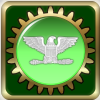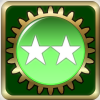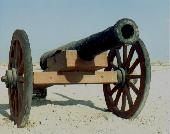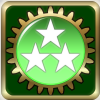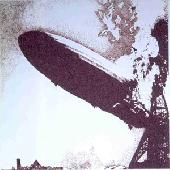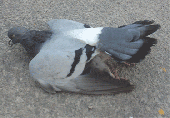-
Mon 23rd Dec 2013 03:48 #1 / 8"I shall pass this but once, any good I can do, or kindness I can show; let me do it now. Let me not difer nor neglect it, for I shall not pass this way again." -Stephen Grellet
I think I've got it figured for smaller boards, with tighter spaces: Don't attack too much, always be able to defend a small holding, in all things, be conservative and patient. And this usually works out pretty good.
But on the bigger maps: Europe 1560 or Ancient Isles of Kjeldor, Gods of the titans etc., this strategy doesn't seem to be holding as much power.
What are some better approaches for big maps?
Continent strategies: go for productive holdings and choke points?
Super agressive: attack like crazy so nobody produces?
Make no enemies: collect your own bonus before breaking someone elses?
What do you think? What's been working?
-
Mon 23rd Dec 2013 16:30 #2 / 8
Grand strategy isn't my forte, but from the school of call-it-like-I-see-it, here are a few thoughts:
My best guess is that your hold-and-defend strategy is getting beat on a big board because you're collecting something like +25, which seems like a lot for players who are experienced in small boards (I mean, +25 is probably a winning turn on Wargear Warfare!). But it's not a lot on a big board - and unlike a small board, the other guys are ALSO getting +25ish.
To defend your +25, you end up spreading out defense across maybe 5 choke points with a +5 at each. Then your opponent attacks only one of them with +25, breaks your continent and now you're looking at like +10 or +6 for your next turn and you're totally boned.
A 25-attacking-5 is going to go his way every time, so quit trying to achieve an impossible defense! 5 dudes across 5 choke points is paper-thin, but those same 25 guys can be an awesome strike force taking you deep into enemy turf.
Use your noggin to think through when to turtle and when to strike, and learn to recognize when it's time to swap from one mode to the other.
Final thought: You might just not have played enough games yet. Assuming you're playing 5 or more players on these things (and if you're not, you should!) 0-for-3 on a big board like HexGear is nothing to be ashamed of; 1-for-7 can make you an instant top player. It takes a long time to finish a game, so it FEELS like you've played a lot of them - you haven't! Play more!
-
 Mon 23rd Dec 2013 17:13 #3 / 8
Mon 23rd Dec 2013 17:13 #3 / 8
But on the bigger maps: Europe 1560 or Ancient Isles of Kjeldor, Gods of the titans etc., this strategy doesn't seem to be holding as much power.
I think you'll want input from BlackDog and Cona on these.
-
 Tue 24th Dec 2013 00:58 #4 / 8
"I shall pass this but once, any good I can do, or kindness I can show; let me do it now. Let me not difer nor neglect it, for I shall not pass this way again." -Stephen Grellet
Tue 24th Dec 2013 00:58 #4 / 8
"I shall pass this but once, any good I can do, or kindness I can show; let me do it now. Let me not difer nor neglect it, for I shall not pass this way again." -Stephen GrelletI always want input from BlackDog and Cona.

-
 Tue 24th Dec 2013 03:03 #5 / 8
Tue 24th Dec 2013 03:03 #5 / 8
I'd say that Luieuil one of the best big board players, so hopefully he'll chime in because in my observations he plays them far differently then I. He seems to play them ultra patiently and try to get others to fight each other while he builds up, whereas, I like to play them more aggressively, especially if the fog is upped. I especially like fog because it suits my style of play on such large boards. Take Civil War, for instance. So many times I'll be playing that on total fog and come across 8-9-10-11-12 troops in some players' cities close to the beginning of the game. Even if these are at their choke points, it's still a complete waste of their troops. Lets say I wipe out 2 cities from an opponent with my 25+ deployment and found them to have 11 and 12 troops respectively. Often it's early enough in the game, moreover, that I know that that must be ALL their cities to have so many units in each and in their next turn they'll get maybe 5 troops and be completely crippled from then on out. Ask yourself this question, would you rather have two cities with 10+ troops in each of them, or 6 cities with 3 in each? Moreover, because your 6 cities are spread out, that acts as a great defense as well and the upped production from this greater number of cities allows you to more quickly clear out the surrounding territory and connect all your cities into a greater collecting mass and I defend that by being aggressive and keeping others too weak to give me a serious push-back.
This same strategy works for me on most big boards. Take bonus fast and hurt all those who might threaten it. Best defense = good offense!
Now, as the fog lifts it becomes more difficult. I still like to be aggressive and increase my bonus, but, now I'm forced to defend them just enough so that more appealing targets are seen elsewhere then me ;-)
Another thing I would say is that as the game progresses and perhaps a natural alliance form (spoken or not) you have to look very closely at how you respond to being attacked by this natural ally. Often if they make a move on you then they are thinking that they can overrun you quickly enough to eliminate you as a threat and then consume your territory so that they can continue on against the greater threat or threats on the board. If this is their thinking and you just push back to your original borders thinking that they'll once again see the logic of peace, then you are being naive. In such a situation I recite the mantra "break bonus before taking back my bonus" and go about trashing their production as much as possible so that they know that it is them to now rebuild good faith and put the borders back where they were and that you are not going to be a pushover. Even if it puts you both back further then would have been preferable in that game, it can make them see that you do in-fact need each other to share those peaceful borders. The problem with this, of course, is the small brained player that turns this into a perpetual battle at the cost of the greater war, but, once you know who such players are, it's good to never let "natural alliances" form with them in the first place. So, mark such players as an enemy, and if you ever find yourself in a fresh game with them then don't go out of your way to fight with them, but, hurt them as a first priority whenever given the chance. (Oh, yeah, if this happens and that other player ends up winning the game then they were right to attack you in the first place and were not being "small brained", so, no need to mark them as enemy despite your anger that they crippled/eliminated you - you must learn to differentiate what might feel like them having a small brain from them just having good strategy. Make this determination by watching the history at the end of the game. You don't want to assign too many enemies in your enemy list as this should be reserved for the true and real idiots of the game who will cost you your game if you give them too much leeway)
What else can I say... Uhm, learn to move on if the battle for a bonus is futile. So many times I'll see a player lose one of their early bonus and they can't seem to let it go. Maybe two players took a bonus in their first turn and then in the second turn the first player takes the second player's bonus from him. It is ridiculous for the second player to continuously counter attack for his lost bonus because, unless another player intervenes, the first player is always going to have a greater bonus from the one he took himself and will eventually prevail in that fight. If someone finds them self in such a position...Big boards A) take a long time, B) have a lot of bonus on them, so move on and don't let one bonus cost you your early game!
Edited Tue 24th Dec 03:12 [history]
-
 Fri 17th Jan 2014 10:06 #6 / 8
Fri 17th Jan 2014 10:06 #6 / 8
I'll try to keep things brief and to the point:
-As the number of players increases, player elimination becomes more important (assuming scaling cards.. don't play a large board without scaling cards!).
-I agree with berick that strategy depends heavily on the fog level. Higher fog = higher aggressiveness. I would never play a large map with no fog.
-No fog / light fog: If I had a "grand strategy" for large maps with low fog levels, it would be to make myself look stronger when I am weak, and weaker when I am strong while patiently waiting for my opportunity to strike for an elimination or easy expansion.
-Medium / Heavy fog: If I had a "grand strategy" for large maps with high fog levels, it would be to play aggressively and take chances based on my intuition.
-
 Fri 17th Jan 2014 19:02 #7 / 8
"If an incompetent chieftain is removed, seldom do we appoint his highest-ranking subordinate to his place" - Attila the Hun
Fri 17th Jan 2014 19:02 #7 / 8
"If an incompetent chieftain is removed, seldom do we appoint his highest-ranking subordinate to his place" - Attila the HunAnother thing to think about with larger boards is to picture how you want the board to look in 5 turns from now. Do you want to be based in the North or South? Do you want to have two fronts or three? Do you want to have a strong player in the end-game with you or a weaker one?
A lot of times you can find opportunities to influence the board dynamics in the early game to end up with a strong position in the mid game and a winning position in the end-game.
-
 Sat 22nd Mar 2014 15:19 #8 / 8
Sat 22nd Mar 2014 15:19 #8 / 8
I lump players into three general categories, as soon as I can gather their holdings, playing style, and intentions: Strength, Weakness, and Chaos.
Those of Strength are the opponents that you expect to battle for the long haul. Every long-term plan you make revolves around them. These players are either too intelligent or were blessed with too strong of an early position to break them early in the game. Misdirection, if possible, is your greatest friend.
Those of Weakness (either weakness in strategy or position) can be pushed out of areas you desire early on, used as buffers with Strong opponents, and/or taken out when opportunity avails itself. Cultivate their weakness. Those with weak strategic patterns can be encouraged to maintain those patterns, so that even if they have a relatively strong early position, you can keep them in check while focusing on other problems.
Those of Chaos are the ones to eliminate immediately (if they are in your proximity) or to leave to their own devices (if they are nearer your enemies). You can plan for rational strength. Irrational opponents, however, severely degrade your capability to strategize. I would sooner run a race into a gale-force headwind than through a whirlwind that randomly changes direction and speed.
If you can somehow influence this "weather" and direct the whirlwinds or the headwinds toward each other, all the better.



